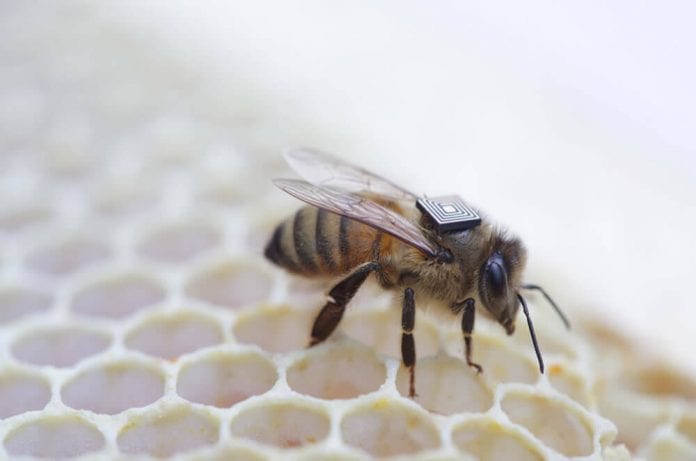Researchers belonging to the Commonwealth Scientific and Industrial Research Organization (CSIRO) of Australia want to identify the reasons causing mass-scale honey bees deaths in the world also described as the colony collapse disorder (CCD). With that objective in mind, it has partnered with Intel Corporation (NASDAQ:INTC) to put backpacks on healthy bees that are only a third of the creature’s normal weight.
The backpack is one of Intel’s Edison wearables computing platform. It has an Atom processor, 5GB storage space, 1GB of memory as well as a battery that harnesses vibration to produce energy. Currently, they have attached RFID chips to around 10,000 bees in Tasmania with the research still on. The Edison Breakout VBoard Kit is put inside a beehive. It tracks the bee movement courtesy the RFID chips. Using a tweezer, the bee is held against the honeycomb. A tiny quantity of superglue is applied so that the tags stick for the bee’s entire lifespan.
The data obtained is dispatched to the Data Access Portal of CSIRO for the use of researchers. The latter then leverage the data to craft a 3D model simulating bee’s movement across the landscape. CSIRO likens the honey bee outfit to an aeroplane’s black box flight recorder. The system assists in tracking and analyzing the repercussions of stress elements that include air pollution, disease, water contamination, pesticides, extreme weather and diet on the bees’ movements and their capacity to pollinate.
As bees are usually predictable, a mechanism to monitor their movements would help researchers pinpoint which specific stressor causes erratic behavior and finally kills them.
Globally, bee colonies are vanishing fast causing widespread alarm. As they account for pollinating roughly one-third of human food sources, fruits and vegetables could become scarce and expensive in the scenario of their declining numbers. Australia is the perfect environment to examine CCD minutely as the nation’s bees are not affected by the Varroa mite parasite till now which has decimated colonies at other places.
Researchers from the UK, New Zealand, Brazil and Mexico have come on board the Global Initiative for Honeybee of Health of CSIRO recently. The scientists intend to give out their findings in 2016. They will also provide their observations with the world scientific community as deaths of honey bees have a bearing on all human beings.
Sources: Intel, zdnet, mashable









